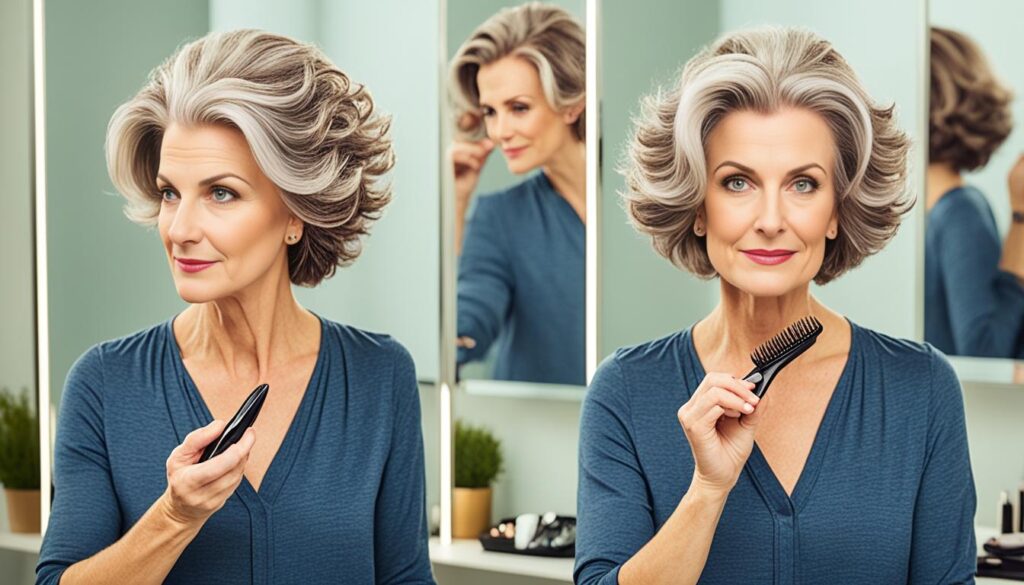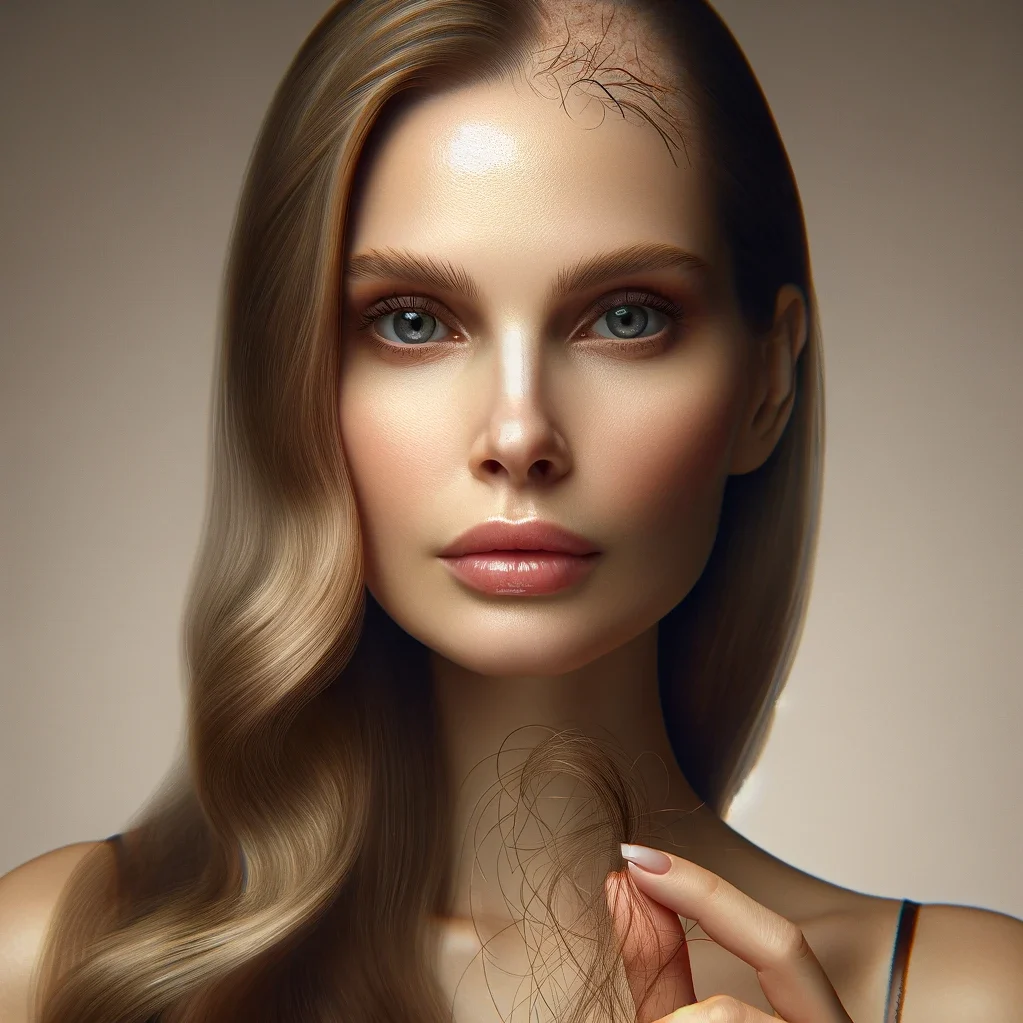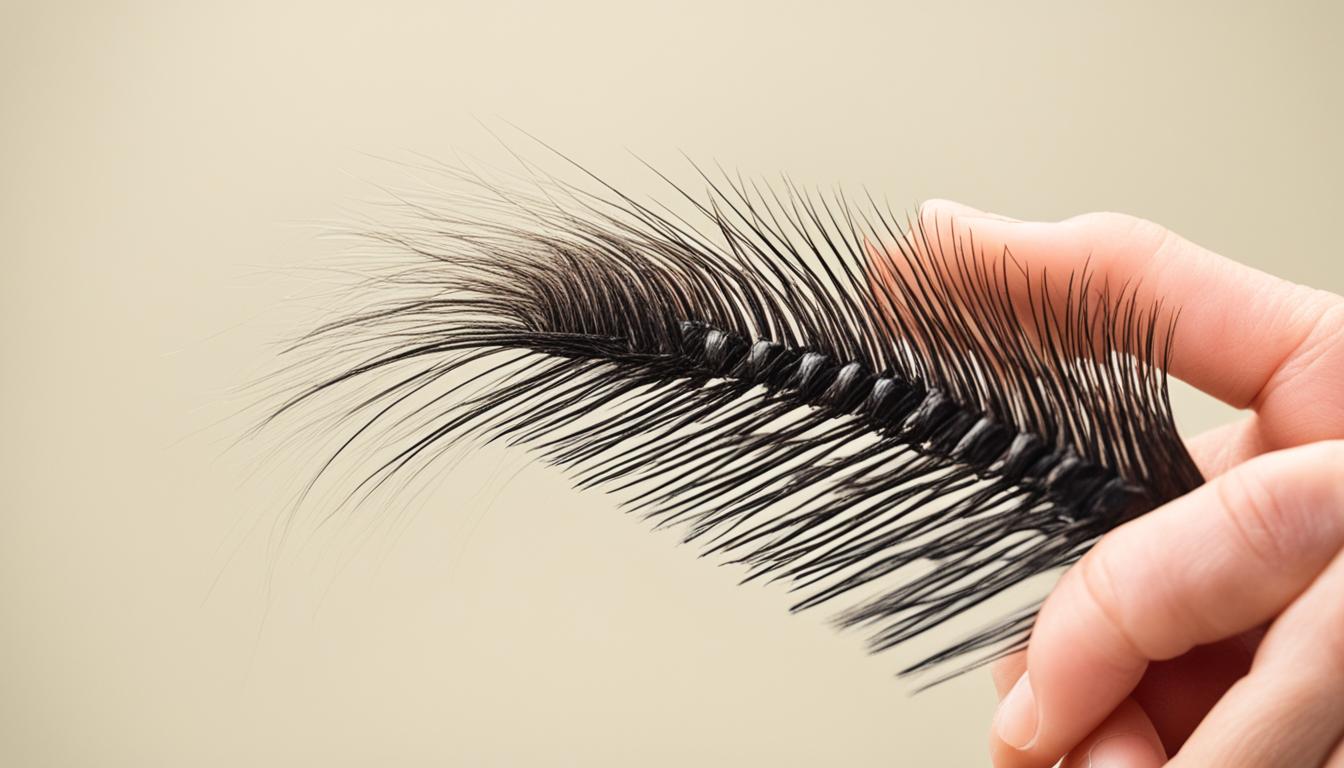Hair loss can have a significant impact on our self-esteem and overall self-confidence. Whether it’s thinning hair, balding, or concerns about hair growth, our personal appearance plays a crucial role in how we perceive ourselves and our self-worth. Dealing with hair loss, especially at a young age, can be emotionally challenging. However, there are practical steps we can take to maintain our self-confidence and boost our emotional well-being.
Key Takeaways:
- Accepting hair loss as a natural process and shifting our perspective can help maintain self-confidence.
- Exploring practical solutions, such as suitable hairstyles and hair care, can enhance our personal appearance and self-perception.
- Seeking therapy or counseling can provide valuable emotional support during the hair loss journey.
- Considering medication or surgical options, like FDA-approved treatments and hair transplantation, can help restore hair and boost self-confidence.
- Remember, hair loss doesn’t define our worth or happiness, and there are various strategies available to enhance our self-esteem despite the challenges of hair loss.
Dealing with Hair Loss: Putting Things in Perspective
It’s essential to recognize that we are often our own worst critics when it comes to hair loss. While losing hair can be distressing, it’s important to realize that others may not view it in the same negative light. For many people, hair loss is just another characteristic that makes them unique. By shifting your perspective and accepting hair loss as part of your appearance, you can maintain your self-confidence and focus on other aspects of your personal growth.
Instead of dwelling on the negative impact of hair loss, consider the following:
- Recognize that personal appearance is multifaceted. Our self-perception is shaped by various factors, including our skills, personality, and achievements. Hair loss, although significant, is just one aspect of our overall identity.
- Remember that self-confidence comes from within. It’s important to cultivate inner strength and self-acceptance. Hair loss does not define your worth as a person.
- Embrace your unique qualities. Hair loss can be seen as a distinguishing feature that sets you apart from others. Owning your appearance and showcasing self-assurance can inspire others and boost your own confidence.
- Focus on personal growth. Instead of fixating on hair loss, channel your energy into developing your talents, pursuing your passions, and nurturing meaningful relationships. Shifting your attention away from external appearance can lead to a profound sense of fulfillment.
“Accepting hair loss as part of your appearance is a crucial step toward maintaining self-confidence and a positive self-perception.” – Dr. Emily Brown, Dermatologist
By putting hair loss into perspective, you can free yourself from the burden of self-consciousness and embrace your personal journey with confidence. Remember, self-assurance radiates from within, and it’s the intangible qualities that truly shape our self-worth and make us who we are.
Practical Ways to Manage Hair Loss
Instead of dwelling on the negative aspects of hair loss, it can be helpful to take a practical approach. Accepting that hair loss is a natural process and finding ways to make it work for you can greatly impact your self-confidence and overall well-being. There are several practical solutions to manage hair loss and embrace your changing appearance.
Experiment with Different Hairstyles
One of the most effective ways to manage hair loss is by experimenting with different hairstyles that suit your hair type. Embrace the changes and find a style that complements your appearance. Whether it’s embracing a buzz cut, trying out a quiff, or opting for a stylish skin fade, there are numerous options available to enhance your overall look. By choosing a hairstyle that suits you and wearing it with confidence, you can turn your hair loss into a distinctive feature that accentuates your personal style.
Consider Proactive Steps
For individuals who want to take a more proactive approach to managing hair loss, there are practical solutions available. FDA-approved medications such as finasteride and minoxidil can help slow down hair loss and even promote hair regrowth in some cases. It’s important to consult with a healthcare professional to determine the best course of action and ensure these medications are suitable for you.
Another option to consider is hair transplantation surgery. This surgical procedure involves transplanting hair follicles from one part of the body to the areas experiencing hair loss. Hair transplantation can provide a long-term solution for individuals seeking to restore their hair and regain their self-confidence. It’s crucial to research and consult with a qualified professional before making any decisions regarding surgery.
Practical Tips for Coping
In addition to experimenting with hairstyles and considering medical interventions, there are practical tips and tricks for managing hair loss on a day-to-day basis:
- Choose hair products that are gentle on the scalp and hair.
- Avoid excessive heat styling or pulling, as it can further damage the hair follicles.
- Be mindful when brushing or combing your hair to prevent unnecessary hair breakage.
Taking these precautions and implementing practical strategies for hair care can help maintain the health of your remaining hair and prevent further hair loss. By prioritizing the well-being of your hair, you can boost your self-confidence and embrace your changing appearance.
We understand that managing hair loss and maintaining self-confidence can be a challenging journey. The key is to find practical solutions that work for you and focus on accepting and embracing your changing appearance. Remember, your hair does not define your worth or happiness. It’s about taking care of yourself, both physically and emotionally, and finding confidence in all aspects of your personal appearance.
Choosing a Hairstyle That Complements Your Hair Loss
Contrary to popular belief, hair loss doesn’t mean you can no longer have a stylish haircut. It’s important to choose a hairstyle that complements your hair loss. For example, a buzz cut, quiff, or skin fade can work well for thinning hair. Manipulating the hair’s length and parting it differently can also help camouflage areas of hair loss. By selecting a hairstyle that suits your hair and wearing it with confidence, you can turn your hair loss into a distinctive feature that enhances your overall appearance.

Proper Hair Care for Those Experiencing Hair Loss
When it comes to hair loss, taking care of your remaining hair is crucial. By following a proper hair care routine, you can maintain the health of your hair follicles and boost your self-confidence. Here are some essential tips for taking care of your hair during hair loss:
1. Use Gentle Hair Products
Using gentle hair products is essential to prevent additional damage to your hair follicles. Look for shampoos and conditioners that are specifically formulated for hair loss or sensitive scalps. These products are often free of harsh chemicals and are designed to nourish and strengthen your hair.
2. Avoid Excessive Heat Styling or Pulling
Excessive heat styling, such as using hot tools like straighteners and curling irons, can cause damage to your remaining hair. Additionally, avoid pulling your hair tightly into hairstyles like ponytails or braids, as this can put stress on your hair follicles and lead to further hair loss.
3. Be Careful During Brushing
When brushing your hair, be gentle and use a wide-toothed comb or a brush with soft bristles. Start from the ends of your hair and work your way up to prevent unnecessary pulling and breakage. Avoid brushing your hair when it’s wet, as wet hair is more prone to damage.
4. Protect Your Hair from the Sun
UV rays can damage your hair and scalp, leading to dryness and further hair loss. To protect your hair, wear a hat or use a leave-in conditioner with SPF when exposed to the sun for extended periods. This will help shield your hair from harmful UV rays and maintain its health.
By following these hair care tips, you can promote the health of your remaining hair and minimize further hair loss. Taking care of your hair follicles is essential for maintaining self-confidence and supporting your overall well-being.

Seeking Emotional Support for Hair Loss
Dealing with hair loss can take a toll on your emotional well-being. It’s natural to experience feelings of sadness, depression, or anxiety when facing this change in your appearance. However, seeking therapy or counseling can provide valuable support during this challenging time.
A therapist or counselor can help you process your emotions and work through any negative thoughts or self-perception issues that may arise due to hair loss. They can provide a safe and non-judgmental space for you to express your concerns and fears. By addressing these emotions, you can begin to develop healthy coping mechanisms and improve your overall well-being.
“Therapy allows individuals to explore their feelings and perceptions about hair loss and its impact on their self-confidence and self-perception. It can provide tools to enhance emotional well-being and build resilience in the face of hair loss.”
Through therapy, you can gain a better understanding of how hair loss affects your self-confidence and self-perception. Your therapist can help you challenge any negative beliefs or distorted thoughts you may have about yourself as a result of hair loss. By reframing these thoughts and embracing your unique appearance, you can cultivate a more positive self-image and boost your self-confidence.
Additionally, therapy can offer guidance on self-care practices and stress management techniques, helping you navigate the emotional challenges that may arise from hair loss. By prioritizing your mental health and emotional well-being, you can strengthen your ability to cope with the impact of hair loss and maintain or regain your self-confidence.
Key Benefits of Seeking Emotional Support for Hair Loss:
- Processing emotions related to hair loss
- Addressing negative thoughts and self-perception issues
- Developing healthy coping mechanisms
- Gaining a more positive self-image
- Improving emotional well-being and resilience
Remember, seeking emotional support is not a sign of weakness but a brave step towards taking care of your mental health. It offers an opportunity to enhance your emotional well-being, build resilience, and improve your overall self-confidence and self-perception.
| Emotional Support for Hair Loss | Benefits |
|---|---|
| Therapy or counseling | Processing emotions, addressing negative thoughts, developing coping mechanisms |
| Positive self-perception | Gaining a better understanding of self-image, reframing negative beliefs |
| Self-care and stress management | Learning practices to enhance emotional well-being and resilience |
Medication and Surgical Options for Hair Loss
In cases where non-invasive solutions are not sufficient, medication and surgical options can be considered to address hair loss and restore self-confidence. These treatment avenues offer effective ways to slow down hair loss, promote hair regrowth, and provide more permanent restoration.
Medication for Hair Loss
Two FDA-approved medications, finasteride and minoxidil, have shown positive results in managing hair loss. Finasteride works by inhibiting the production of the hormone dihydrotestosterone (DHT), which is responsible for miniaturizing hair follicles. Minoxidil, on the other hand, stimulates hair growth and increases the size of hair follicles.
These medications are available in different forms, including oral tablets and topical solutions, and their effectiveness may vary from person to person. Consultation with a healthcare professional can help determine the most suitable medication and dosage for your specific needs.
Hair Transplantation Surgery
For individuals seeking a more permanent solution, hair transplantation surgery can be considered. This surgical option involves transplanting healthy hair follicles from the donor area to the areas experiencing hair loss.
The procedure is performed under local anesthesia and can be customized to address specific concerns. Advanced techniques, such as follicular unit extraction (FUE) and follicular unit transplantation (FUT), ensure natural-looking results and minimal scarring.
It’s important to note that while hair transplantation surgery offers long-lasting results, it may require multiple sessions depending on the extent of hair loss and desired density. A thorough consultation with a qualified hair restoration specialist can provide detailed information about the procedure, potential risks, and expected outcomes.
Whether opting for medication or surgical options, it is essential to consult with a healthcare professional specializing in hair restoration. They can assess your specific condition, discuss the best course of action, and guide you throughout the journey towards restoring your hair and regaining your self-confidence.
Conclusion
Hair loss can have a significant impact on our self-esteem and emotional well-being. However, there are numerous ways to boost our self-confidence and maintain a positive self-perception while dealing with these concerns. By putting hair loss into perspective and finding practical solutions such as choosing suitable hairstyles and taking care of our hair, we can take control of our personal appearance.
Seeking emotional support through therapy can also be beneficial in dealing with the emotional challenges that hair loss can bring. Additionally, considering medication or surgical options can provide further solutions for hair restoration and ultimately enhance our overall well-being.
Remember, hair loss does not define our worth or happiness. It is important to prioritize our self-esteem and recognize that there are various strategies available to help us embrace our individuality and enhance our self-confidence, regardless of hair loss concerns. By taking proactive steps and embracing our unique journey, we can boost our self-esteem and emotional well-being.
FAQ
How does hair loss affect self-esteem?
Hair loss can have a significant impact on a person’s self-esteem, especially when it occurs at a young age. It can lead to feelings of self-doubt, decreased self-confidence, and a negative self-perception.
How can I maintain self-confidence while dealing with hair loss?
You can maintain self-confidence while dealing with hair loss by putting things into perspective, finding practical solutions, choosing a suitable hairstyle, taking care of your hair, seeking therapy if necessary, and considering hair transplantation surgery.
How can I put hair loss into perspective?
It’s important to recognize that we are often our own worst critics when it comes to hair loss. By shifting your perspective and accepting hair loss as part of your appearance, you can maintain your self-confidence and focus on other aspects of your personal growth.
What are some practical ways to manage hair loss?
Rather than dwelling on the negative aspects of hair loss, you can take a practical approach by experimenting with different hairstyles, using FDA-approved medications like finasteride and minoxidil, and considering hair transplantation surgery.
How can I choose a hairstyle that complements my hair loss?
Contrary to popular belief, hair loss doesn’t mean you can no longer have a stylish haircut. By selecting a hairstyle that suits your hair and wearing it with confidence, you can turn your hair loss into a distinctive feature that enhances your overall appearance.
How should I care for my remaining hair when experiencing hair loss?
To maintain the health of your remaining hair and prevent further hair loss, it’s important to use gentle hair products, avoid excessive heat styling or pulling, and be careful during brushing.
Should I seek emotional support for my hair loss?
Hair loss can have a significant impact on a person’s emotional well-being, leading to feelings of depression or anxiety. Seeking therapy or counseling can provide valuable emotional support, helping you process your emotions and develop healthy coping mechanisms.
What are the medication and surgical options for hair loss?
FDA-approved medications like finasteride and minoxidil can help slow down hair loss and promote hair regrowth. Hair transplantation surgery is a surgical option for individuals seeking more permanent hair restoration. Consulting with a healthcare professional can provide further information about these treatment options.
How can I boost my self-confidence despite hair loss?
By putting hair loss into perspective, finding practical solutions, choosing suitable hairstyles, taking care of your hair, seeking emotional support, and considering medication or surgical options, you can enhance your self-esteem and maintain or regain your self-confidence.


1 thought on “Boosting Self-Esteem Amid Hair Loss Concerns”